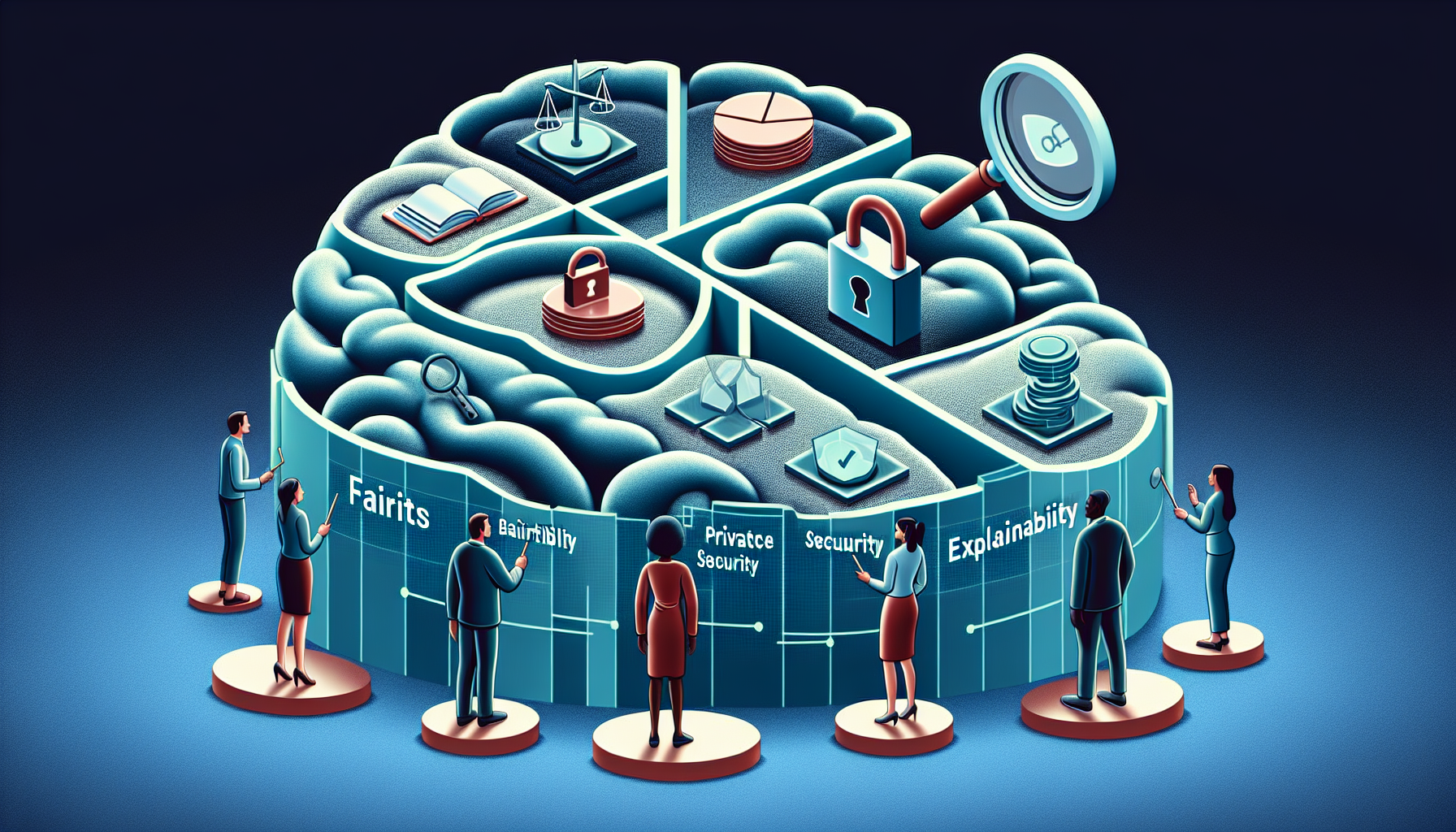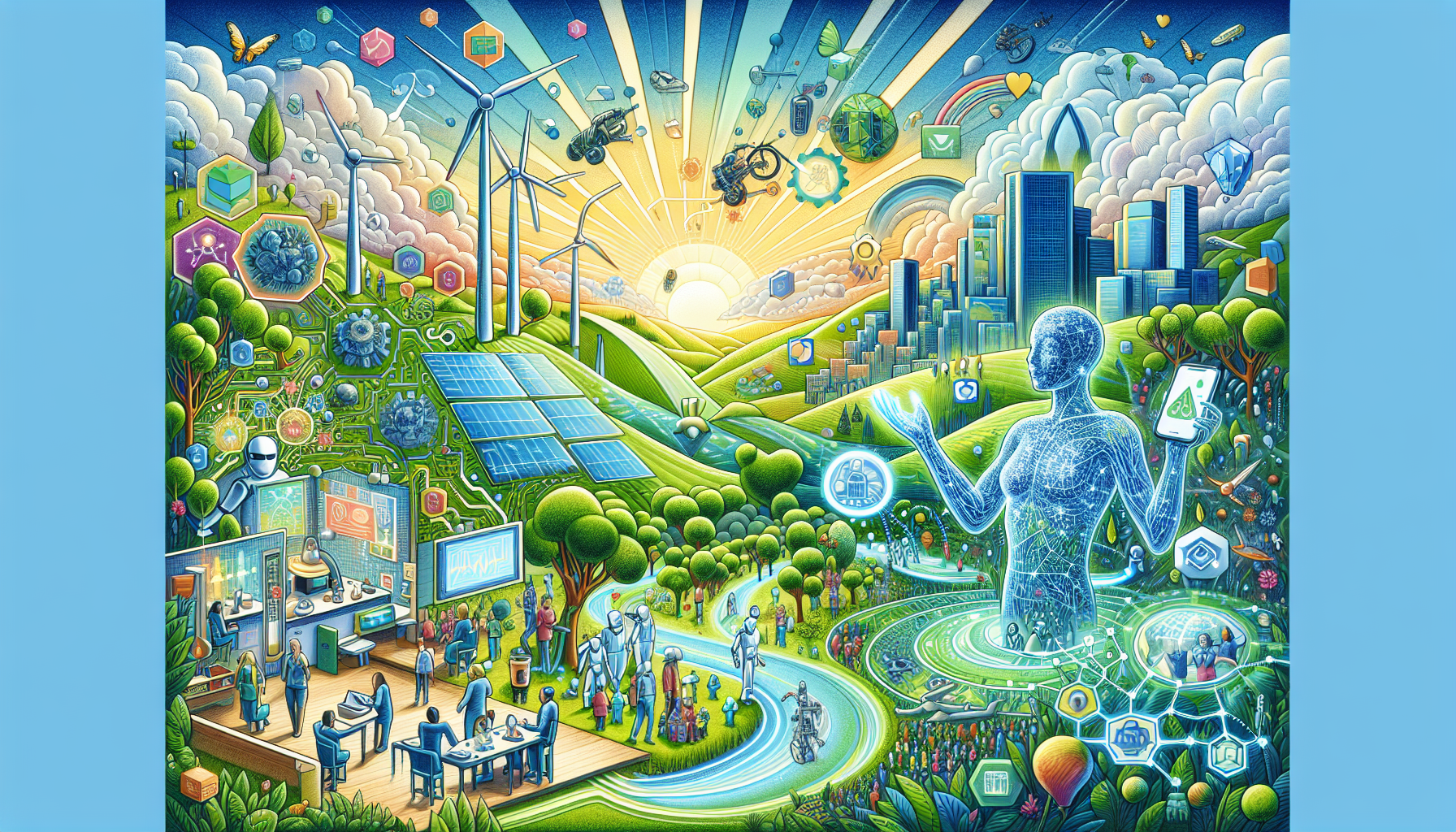In the pursuit of social advancement, ‘AI for social good’ marks a critical intersection where technology meets humanity. This phrase captures the essence of AI’s role in advancing healthcare, sustainability, and equity. This article will take you through how AI is practically aiding in these areas, the partnerships propelling these efforts, and the essential ethical standards that ensure AI’s benefits are universally shared.
Key Takeaways
-
AI for Social Good leverages artificial intelligence to address pressing societal issues such as climate change, public health, and social inequalities, while promoting renewable energy optimization, improving healthcare accessibility, and enhancing educational opportunities.
-
Interdisciplinary collaboration among industry, academia, government, nonprofits, and NGOs is crucial for driving AI advancements and ensuring the successful integration and ethical application of AI solutions into society.
-
Ethical considerations in AI development are vital, including addressing biases, ensuring privacy and security, and promoting explainability and transparency, alongside tackling implementation challenges such as data quality, talent shortages, and last-mile deployment.
The Power of AI in Tackling Societal Challenges
The vast potential of artificial intelligence is now being harnessed to confront societal challenges, merging AI expertise with in-depth knowledge of computer science and sociotechnical systems. AI is proving to be an indispensable ally in various fields, including:
-
Urban computing
-
Environmental sustainability
-
Public welfare
-
Health
It’s a call to arms for anyone who wishes to contribute, leveraging technology to create meaningful change.
This movement is driven by a steadfast commitment to develop AI solutions that address the heart of societal challenges, and an open invitation for collaboration bears witness to its inclusive spirit.
Climate Change Solutions
The battle against climate change is being fortified with AI-driven strategies, including advanced weather prediction, renewable energy optimization, and efficient energy storage management. Google DeepMind’s GraphCast AI model exemplifies this with its ability to forecast severe weather events up to ten days in advance, aiding in climate change preparedness.
Furthermore, AI is revolutionizing renewable energy sectors in the following ways:
-
Predictive analytics fine-tune solar energy generation times
-
AI pinpoints the best locations for wind turbines, optimizing wind energy output
-
Intelligent management of energy storage ensures surplus power is effectively saved and distributed to match demands
These advancements are making a substantial impact in the renewable energy industry.
Public Health Improvements
Imagine a world where healthcare is not just a privilege but a right, made possible through AI’s transformative capabilities. The management and analysis of copious health data, critical for new research and enhancing patient care, is now streamlined by AI technologies.
The American Red Cross’s utilization of AI in optimizing blood supply chains exemplifies AI’s positive social impact in healthcare, revolutionizing the donor experience and ensuring life-saving resources are efficiently allocated.
Reducing Social Inequalities
AI’s role in fostering equity cannot be overstated, as it crafts personalized learning platforms that tailor educational content to individual student needs, thereby enhancing learning experiences. Solve Education’s AI chatbots have significantly increased student engagement, demonstrating how focused AI applications can bridge the educational divide. However, vigilance is required to ensure AI doesn’t perpetuate historical biases; initiatives like Shaqodoon’s AI for automated labeling of voice recordings strive for efficiency while maintaining equal treatment, showcasing AI’s potential to reduce social inequalities.
Collaborative Efforts for AI Advancements
A collective endeavor, AI for social good thrives on the backbone of interdisciplinary partnerships sparking this global movement. Understanding the nuances of various domains and their unique challenges necessitates the coming together of diverse expertise. Whether it’s researchers dedicating their time to social impact initiatives or collaborations that transcend traditional sector boundaries, these combined efforts are crucial for the successful integration of AI solutions into our daily lives.
Industry and Academia Collaboration
The symbiotic relationship between industry and academia is a catalyst for AI advancements. Projects that span from precision medicine to smart logistics have been born from such collaborations, showcasing their potential to innovate beyond existing methods. In this context, the involvement of a research group can further enhance the progress and outcomes of these projects.
Backed by tech giants and bolstered by the intellectual capabilities of universities, we’re observing the birth of AI solutions addressing intricate challenges. This proves the limitless possibilities when industry and academia join forces.
Government Initiatives
Governments worldwide are stepping up to the plate, recognizing the need to foster AI for social good through supportive policies, funding, and open data initiatives.
The collective effort of policymakers and industry leaders shapes a conducive environment for AI applications, driving forward a socially responsible technology agenda.
Nonprofit and NGO Partnerships
Nonprofits and NGOs, often at the frontlines of social challenges, are tapping into AI’s transformative power. The Global Partnership on Artificial Intelligence is one such initiative, aligning AI advancements with human rights and democratic values to make AI resources more accessible to diverse sectors.
The creation of platforms like Tech To the Rescue enables software engineers to volunteer their skills, helping nonprofits implement affordable AI solutions, demonstrating the power of community and technology in creating culturally attuned, user-centric solutions.
Ethical Considerations in AI for Social Good

Far from being an afterthought, ethical considerations form the cornerstone of responsible AI development. Ensuring that AI benefits all stakeholders equally and contemplates potential harms forms the ethical foundation of AI for social good.
Taking the lead, AI researchers are infusing ethics and inclusivity into AI systems, an essential move towards fostering trust and manifesting tangible impact.
Bias and Fairness
Bias in AI is a multifaceted issue that can arise at any development stage, from data collection to model training. Addressing representation bias, measurement bias, and aggregation bias is paramount to ensuring fairness and avoiding perpetuating societal biases.
AI systems must be developed with high-quality data and held accountable, particularly in sectors like criminal justice and employment, to prevent discrimination and ensure equitable outcomes. AI research, including reinforcement learning, plays a crucial role in achieving these goals.
Privacy and Security
As AI technologies evolve, associated concerns about privacy and security keep pace. The potential for misusing personal data underlines the need for stringent security measures and adherence to regulations like GDPR to protect individuals’ privacy.
Security is not just about protecting data but also about safeguarding AI against malicious uses, such as creating fake profiles or manipulating images, ensuring the technology remains a tool for good.
Explainability and Transparency
Explainable AI is the key to unlocking trust and user empowerment. The ability to interpret AI model results is essential, especially when deploying AI solutions in real-life scenarios, such as natural language processing.
Aiming for explainability and transparency enables stakeholders to gain a clearer understanding of AI applications’ decision-making processes, thereby boosting confidence in the technology’s role in promoting social good.
Overcoming Obstacles to AI Implementation
The implementation of AI solutions for social good presents its own set of challenges. Addressing societal problems requires consideration beyond technical algorithmic solutions, focusing on deploying strategies that tackle last-mile implementation hurdles.
Understanding and navigating context-specific challenges and non-technical barriers are essential for delivering actual social impact on the ground.
Data Accessibility and Quality
Data is the lifeblood of AI systems, and ensuring its accessibility and quality is crucial for effective training and evaluation in social impact projects. The use of verified, validated, and diverse data sets with transparent sourcing methods can significantly enhance AI models’ outcomes, making them more relevant and impactful. Harnessing big data and employing data science techniques can further improve these results by providing a larger pool of information to work with.
Talent Shortage and Capacity Building
The talent shortage in AI is a pressing issue, with high-level expertise being a rare commodity. Addressing this gap requires a concerted effort in education and capacity building.
By empowering local communities through AI training and development programs, organizations like Youth for Technology Foundation and Deep Learning Indaba are helping to cultivate indigenous solutions and build capacity for AI’s future.
Last-Mile Implementation
Successful last-mile implementation of AI hinges on engaging stakeholders from various sectors, be it health, sustainability, or community violence prevention. These experts and advocates play a vital role in contextualizing AI solutions, ensuring that they are tailored to meet the specific needs of low-resource communities.
Inspiring Case Studies of AI for Social Good

Powerful narratives of AI’s potential to catalyze positive change are provided by real-world case studies. Partnerships like the Global Alliance for Social Entrepreneurship and Microsoft Research highlight the strength of collaboration in applying AI for social good.
Platforms like EkStep Foundation’s Sunbird demonstrate how scalable digital infrastructure can transform sectors like education.
Environmental Sustainability
AI’s impact on environmental sustainability is profound, with applications ranging from data-driven mapping for conservation to optimizing supply chains. MapBiomas’s work in Brazil exemplifies how AI and machine learning can aid in land use decision-making for conservation purposes.
Companies like Maersk, IBM, and Walmart are leveraging AI to reduce fuel consumption, carbon emissions, and packaging waste, showcasing AI’s potential to shape a sustainable future.
Empowering Communities
AI co-creation and citizen engagement are empowering local communities to take charge of regional issues, advocating for policy action and social impact. The Smell Pittsburgh Project and RISE project serve as prime examples of how AI tools can facilitate environmental monitoring and drive change through data collection and advocacy.
Innovations in Healthcare
In healthcare, AI innovations, including computer vision, are revolutionizing diagnostics and surgeries, and enhancing patient engagement. From AI-enhanced prenatal imaging to the use of robotic systems like da Vinci for surgeries, these technological advances are redefining healthcare.
AI chatbots are also playing a pivotal role in delivering personalized health tips and improving medication adherence, highlighting AI’s versatility in healthcare applications.
Summary
Throughout this exploration, it is evident that AI’s potential to address societal challenges is not only promising but actively unfolding. From the innovative solutions tackling climate change and public health issues to the collaborative efforts bridging talent gaps and implementing last-mile solutions, AI for social good is a testament to the synergy of technology and human ingenuity. As we move forward, the ethical considerations and inspiring case studies remind us of the transformative power AI holds to shape a sustainable, equitable, and healthier future for all.
Frequently Asked Questions
What are the key societal challenges AI is currently being applied to?
AI is currently being applied to address societal challenges such as climate change, public health, and social inequalities, with specific applications in environmental sustainability, healthcare, and personalized education. This demonstrates the potential for AI to positively impact various aspects of society.
How is AI helping in climate change preparedness?
AI helps in climate change preparedness by providing accurate weather predictions, optimizing renewable energy generation, and managing energy storage, as demonstrated by Google DeepMind’s GraphCast AI model. This can significantly improve our ability to mitigate the impacts of climate change on our environment and infrastructure.
What role do government initiatives play in AI for social good?
Government initiatives play a crucial role in AI for social good by providing funding, shaping policies, and offering open data, creating an environment conducive to responsible AI development and deployment.
Can AI perpetuate biases, and how is fairness ensured?
Fairness in AI is ensured by addressing representation, measurement, and aggregation biases, using high-quality data, and adhering to ethical standards, preventing the perpetuation of biases.
What are some examples of AI’s impact on healthcare?
AI has greatly influenced healthcare, leading to improved medical diagnostics, robotic surgeries, and personalized health tips for patients’ well-being. These advancements have significantly enhanced patient care and treatment.
Leave a Reply